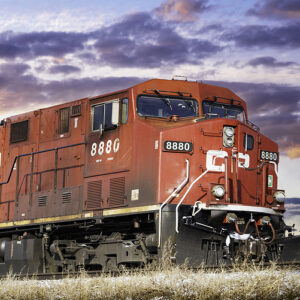The federal Surface Transportation Board (STB) announced Wednesday it is allowing the merger of the Canadian Pacific and Kansas City Southern railroads, creating a rail megacorp and marking the first time that a single rail company will span the entirety of North America.
While advocates say the merger will add speed to the nation’s supply chain and spur investment, opponents — including many in President Joe Biden’s own party — were angered the administration would sign off on such a deal just a month after the catastrophic derailment in East Palestine, Ohio.
“The approval of this merger … will cause another two million tank cars of hazardous materials – just like the ones that derailed in East Palestine – to move across the merged rail lines,” Ohio state Sen. Michael Rulli (R) said in a letter to the STB earlier this month. “We need the relevant federal regulators to take appropriate action to ensure tragedies like what we’ve seen in East Palestine do not occur again,” Rulli argued.
In its announcement, which it streamed via YouTube, the STB said it “expects the merger and imposed conditions to result in an overall public benefit,” in part because it is projected to “reduce travel time for traffic moving over the single-line service.” The agency also predicted “increased incentives for investment” in the rail industry.
“We found that this merger will enhance the creation of a robust rail network, ultimately one that will be safe and environmentally friendly, and that is why we approved it,” STB Chairman Martin Oberman said at Wednesday’s press conference, adding it would bring “a stronger competitive landscape in the railway industry.”
The $31 billion merger “will create the first railroad providing single-line service spanning Canada, the United States, and Mexico,” the STB said. The network of lines will run from north to south at Edmonton in Canada to near Mexico City, with routes running from east to west in and out of Canada and the U.S. from Saint John’s to Vancouver.
The STB highlighted its case that the increased rail traffic “will be safer, more efficient, and will have fewer emissions than the truckloads that it will remove from North American roads.”
Opponents remain unconvinced. A coalition of Illinois congressional Democrats released a statement Wednesday condemning the plan’s potential impact on communities along the route. Among them were Sens. Dick Durbin and Tammy Duckworth.
“We are deeply disappointed that the Surface Transportation Board has sided with corporations over our constituents in the Chicago region,” they wrote. “As we have repeatedly reminded the STB, the merger will have dramatic impacts on freight traffic in Illinois that will undoubtedly impact the safety, congestion, and livelihood of Illinois communities as well as disrupt Metra’s commuter rail operations that Illinoisans rely on to access jobs, education, and work.”
A group of Illinois communities created a coalition to oppose the merger. Their members held a press conference after Oberman’s. Bensenville (Ill.) Village President Frank DeSimone said the STB decision “ignored our concerns for safety. It ignored our concerns about quality of life.”
Other critics raised antitrust objections, saying the merger will make the rail industry less competitive and drive up prices for consumers. Sen. Elizabeth Warren (D-Mass.) called for the merger to be abandoned, claiming it “would reduce competition in an already highly consolidated market and could cause increased shipping costs.”
Warren cited Davenport, Iowa’s former Mayor Bill Gluba, who called the proposed merger “a disaster of monumental proportions just waiting to happen” for communities like his.
Diana Moss of the American Antitrust Institute told InsideSources she shared Warren’s concerns about consolidation.
The CP-KCS deal “will make for more than 20 rail industry mergers in the last seven years,” Moss said. “The U.S. has seen massive consolidation, especially in Class 1 railroads, in the last several decades. This has hurt shippers and consumers through higher prices, lower quality, and less innovation.
“Antitrust review is badly needed in this sector,” she added.
The Biden administration itself indicated, through a Department of Justice filing in January, that it was opposed to the merger. And after the decision was announced, a White House official told Politico they are “currently reviewing the text of their decision.”
However, all but one of the members of the Surface Transportation Board were appointed by Biden.
Biden’s EPA also joined in, raising concerns about environmental justice. “EPA recommends the STB may need to conduct further analysis to determine the disproportionate adverse impact the proposed acquisition will have on each localized EJ community,” it wrote in a letter to the Department of Transportation.
And Biden ally Sen. Richard Blumenthal (D-Conn.) said the decision “needs to be scrutinized.”
The STB’s decision takes effect on April 14. Petitions for reconsideration of the decision must be filed by April 4 and requests for a stay must be filed by March 27.
Oberman said Wednesday that the board had “act[ed] in the best interest of the country as a whole,” and he urged critics to accept the decision.
“I’m confident in saying this data cannot be studied any further,” Oberman said. “It has been studied until your eyeballs have been falling out.”


